Hair loss, a prevalent concern among men, not only affects their physical appearance but also has profound implications for their self-esteem and overall well-being. Understanding the causes of hair loss and exploring the available prevention and treatment options can empower men to take proactive steps in addressing this common issue.
From genetic predispositions to medical conditions and lifestyle factors, the causes of hair loss in men are diverse. Androgenetic alopecia, commonly known as male-pattern baldness, is a hereditary condition influenced by genetics and hormones, leading to a receding hairline and thinning crown.
Alopecia areata, an autoimmune disorder, causes patchy hair loss, while other medical conditions, medications, and lifestyle factors can also contribute to hair loss.
Introduction
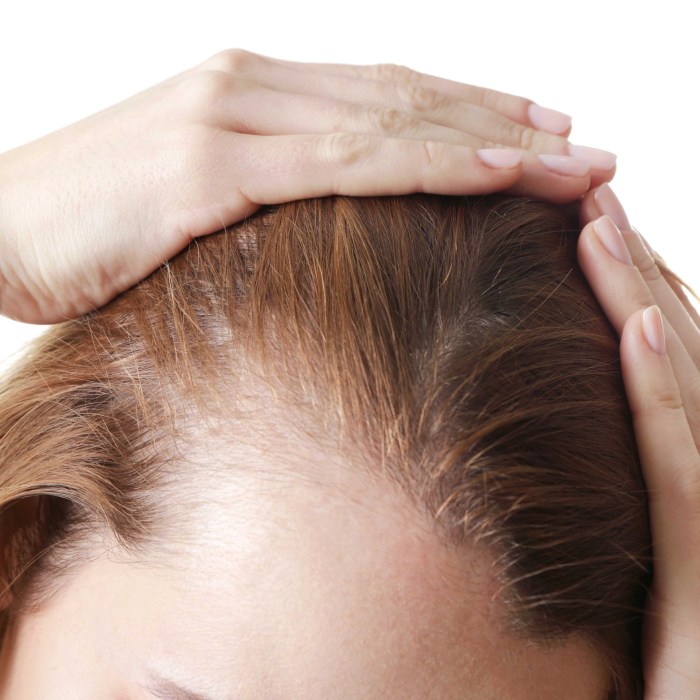
Hair loss, also known as alopecia, is a common condition that affects a significant portion of the male population. It refers to the thinning or complete loss of hair from the scalp, beard, or other parts of the body. The prevalence of hair loss among men varies, but it is estimated that approximately 50% of men experience some degree of hair loss by the age of 50.
Hair loss can have a profound impact on a man’s self-esteem and overall well-being. It can lead to feelings of insecurity, anxiety, and depression. In some cases, it can also affect a man’s social and professional life.
Causes of Hair Loss in Men
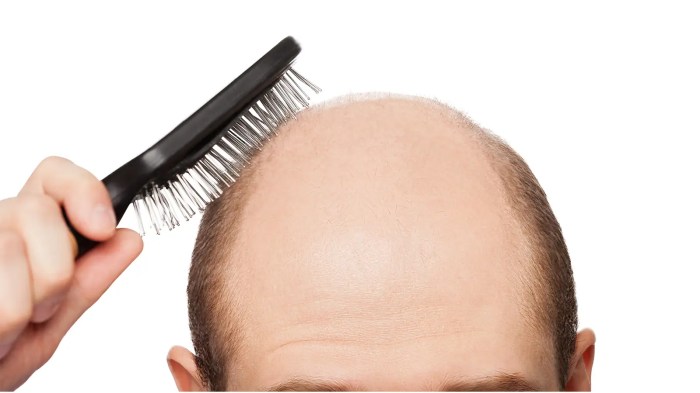
Hair loss in men can be a common concern, affecting individuals of all ages. Understanding the underlying causes of hair loss is crucial for addressing the issue effectively. Here are two prevalent causes of hair loss in men:
Androgenetic Alopecia (Male-Pattern Baldness)
Androgenetic alopecia, often referred to as male-pattern baldness, is a common cause of hair loss in men. It is a hereditary condition influenced by genetics and hormones.
- Genetics: Androgenetic alopecia is influenced by specific genes that are passed down from both parents. These genes determine the sensitivity of hair follicles to a hormone called dihydrotestosterone (DHT).
- Hormones: DHT is a hormone produced from testosterone. In individuals with androgenetic alopecia, DHT binds to receptors in hair follicles, causing them to shrink and produce thinner, weaker hairs over time. This process eventually leads to hair loss.
Male-pattern baldness typically follows a predictable pattern:
- Receding Hairline: Hair loss often begins with a receding hairline at the temples.
- Thinning Crown: As the condition progresses, hair loss occurs at the crown of the head.
- Advanced Stages: In advanced stages, hair loss can progress to a horseshoe-shaped pattern around the sides and back of the head.
Alopecia Areata
Alopecia areata is an autoimmune condition that causes hair loss in patches. It occurs when the immune system mistakenly attacks hair follicles, leading to inflammation and hair loss.
- Autoimmune Nature: Alopecia areata is characterized by an autoimmune response, where the body’s immune system targets and attacks its own hair follicles.
- Types of Alopecia Areata: There are different types of alopecia areata, including:
- Alopecia Areata Patchy: This is the most common type, causing round or oval patches of hair loss.
- Alopecia Areata Totalis: This type results in complete hair loss on the scalp.
- Alopecia Areata Universalis: This type causes total hair loss on the entire body, including the scalp, eyebrows, eyelashes, and other body hair.
Other Causes of Hair Loss
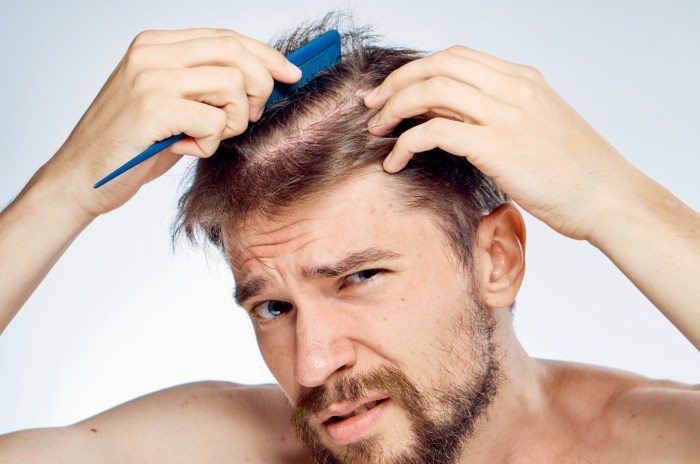
Apart from genetic predisposition and aging, there are various other factors that can contribute to hair loss in men. These include medical conditions, medications, and lifestyle factors.
Medical Conditions
Certain medical conditions can lead to hair loss as a symptom. These include:
- Thyroid Issues: An overactive or underactive thyroid gland can disrupt the normal hair growth cycle, leading to hair loss.
- Hormonal Imbalances: Androgenetic alopecia, the most common type of hair loss in men, is caused by an imbalance of hormones, particularly testosterone and dihydrotestosterone (DHT).
- Scalp Infections: Fungal or bacterial infections of the scalp, such as ringworm or folliculitis, can cause hair loss in the affected areas.
Medications
Some medications can have hair loss as a side effect. These include:
- Chemotherapy: Drugs used in chemotherapy to treat cancer can cause temporary hair loss as a side effect.
- Blood Thinners: Certain blood thinners, such as warfarin, can cause hair loss as a rare side effect.
- Antidepressants: Some antidepressants, such as fluoxetine and paroxetine, can cause hair loss as a side effect.
Lifestyle Factors
Certain lifestyle factors can also contribute to hair loss in men:
- Stress: Chronic stress can lead to hair loss as a temporary side effect.
- Poor Diet: A diet deficient in essential nutrients, such as protein, iron, and vitamins, can contribute to hair loss.
- Smoking: Smoking can damage hair follicles and lead to hair loss.
Prevention and Treatment Options
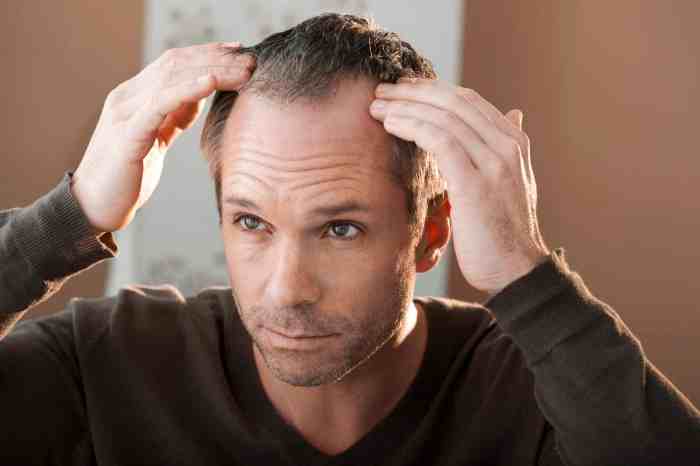
Hair loss is a common concern for men, but there are steps you can take to prevent it and treat it if it does occur.
Lifestyle modifications, medical treatments, and surgical interventions are all potential options for preventing and treating hair loss.
Lifestyle Modifications
Simple changes to your lifestyle can help prevent or slow hair loss.
- Diet: Eating a healthy diet rich in fruits, vegetables, and whole grains can help promote hair growth.
- Stress management: Chronic stress can contribute to hair loss. Find healthy ways to manage stress, such as exercise, meditation, or yoga.
- Hair care practices: Avoid harsh chemicals and hairstyles that pull on your hair. Wash your hair regularly with a mild shampoo and conditioner.
Medical Treatments
There are several medical treatments available for hair loss.
- Minoxidil: This topical medication is applied to the scalp to stimulate hair growth.
- Finasteride: This oral medication is used to treat male-pattern baldness. It works by blocking the conversion of testosterone to dihydrotestosterone (DHT), a hormone that contributes to hair loss.
- Laser therapy: This treatment uses low-level laser light to stimulate hair growth.
- Scalp micropigmentation: This procedure involves tattooing tiny dots on the scalp to create the appearance of a fuller head of hair.
Surgical Interventions
In some cases, surgical intervention may be necessary to treat hair loss.
- Hair transplant: This procedure involves taking hair from another part of the body and transplanting it to the balding area.
Coping with Hair Loss
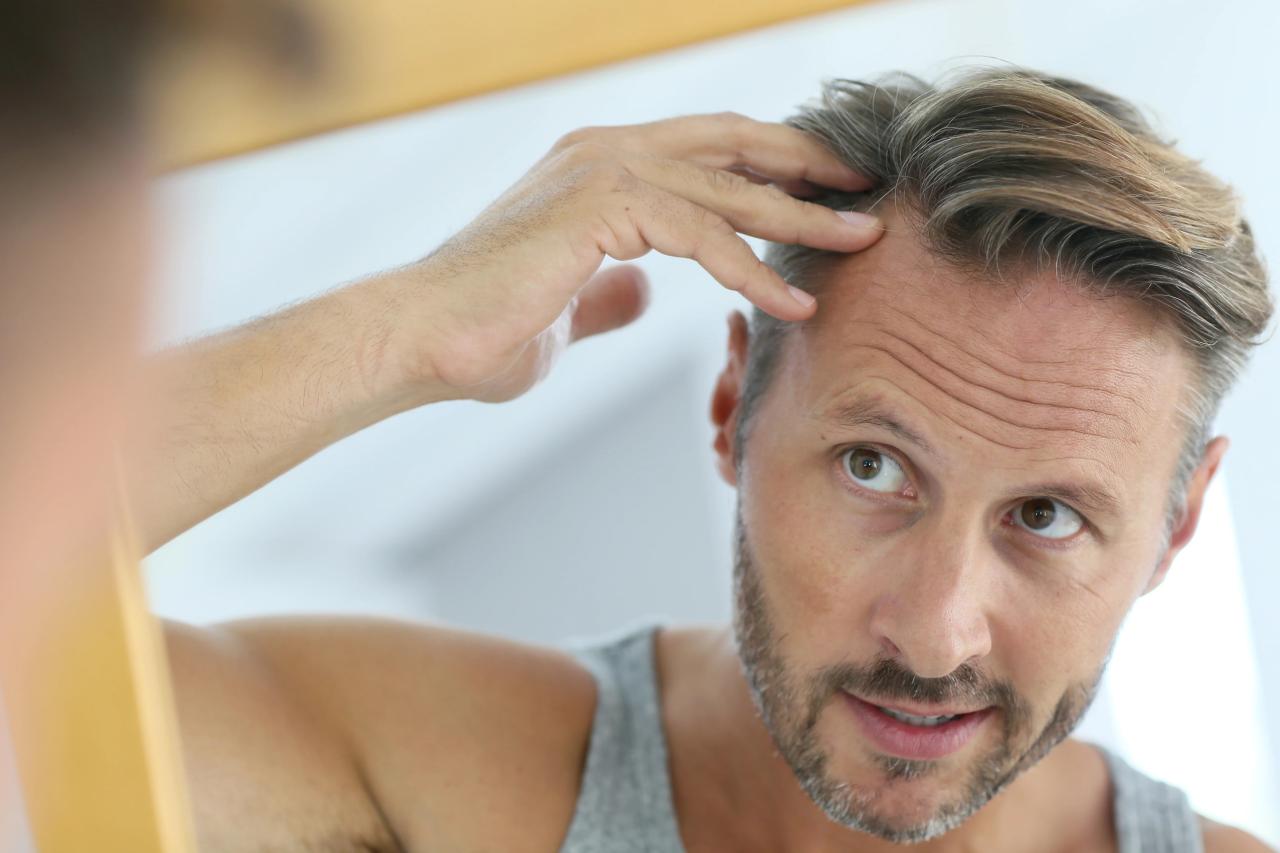
Hair loss can be a challenging experience, impacting both men and women. It can lead to feelings of insecurity, anxiety, and depression. It’s important to recognize that hair loss is a common condition and that there are ways to cope with it and maintain a positive self-image.
Emotional and Psychological Impact
Losing hair can trigger a range of emotions, including sadness, anger, and frustration. It can affect a person’s sense of identity and self-esteem. Hair is often seen as a symbol of beauty and virility, so its loss can be particularly difficult for men.
Strategies for Building Self-Confidence and Seeking Support
-
-*Embrace your new look
Gradually adjust to your changing appearance and find ways to highlight your positive features.
-*Seek support from loved ones
Talk to friends, family members, or a therapist about your feelings. Sharing your concerns can provide comfort and validation.
-*Consider joining a support group
Connecting with others who are going through similar experiences can offer a sense of community and understanding.
Hairstyle and Grooming Tips
There are several hairstyles and grooming techniques that can help minimize the appearance of hair loss and enhance your overall look.
Hairstyles that Minimize Hair Loss
-
-*Shorter haircuts
Shorter hairstyles can make hair look thicker and fuller.
-*Layered haircuts
Layers can add volume and texture to thinning hair.
-*Styling products
Using volumizing shampoos, conditioners, and styling products can create the illusion of thicker hair.
Hair Care Products and Styling Techniques
-
-*Choose volumizing products
Look for products that are specifically designed to add volume and body to hair.
-*Avoid harsh chemicals
Avoid using harsh chemicals, such as bleach or peroxide, which can damage hair and make it more prone to breakage.
-*Use a wide-toothed comb
Brushing or combing hair too vigorously can cause breakage. Use a wide-toothed comb to gently detangle hair.
Outcome Summary
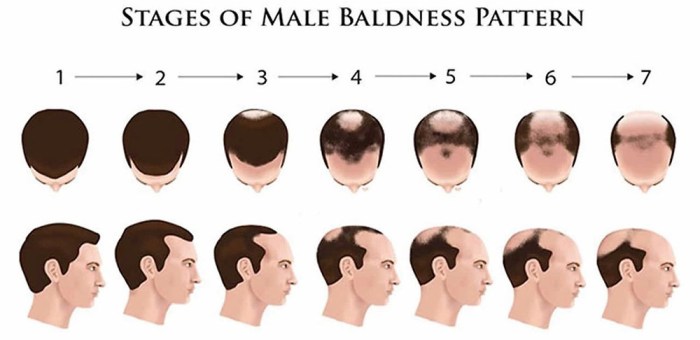
Hair loss in men is a multifaceted issue with various causes, ranging from genetic predispositions to medical conditions and lifestyle factors.
Understanding these causes and exploring the available prevention and treatment options can empower men to take proactive steps in addressing this common concern. From lifestyle modifications and medical treatments to surgical interventions, there are various approaches available to help men manage and cope with hair loss.
Ultimately, seeking professional advice and support can help men navigate the emotional and psychological challenges associated with hair loss and regain their confidence and well-being.
Common Queries
Can stress cause hair loss in men?
Yes, stress can be a contributing factor to hair loss in men. Chronic stress can lead to an increase in the production of the stress hormone cortisol, which can affect hair growth and cause temporary hair loss.
Can poor diet contribute to hair loss in men?
Yes, a poor diet lacking essential nutrients can contribute to hair loss in men. A balanced diet rich in vitamins, minerals, and proteins is crucial for healthy hair growth.
Are there any medications that can cause hair loss in men?
Yes, certain medications, such as chemotherapy drugs, blood thinners, and some antidepressants, can have hair loss as a side effect. It is important to consult a healthcare provider for more information.
What are some lifestyle changes that can help prevent hair loss in men?
Lifestyle changes that can help prevent hair loss in men include managing stress, maintaining a healthy diet, getting regular exercise, and avoiding excessive smoking and alcohol consumption.
What are some treatment options for hair loss in men?
Treatment options for hair loss in men include topical medications like minoxidil and finasteride, laser therapy, scalp micropigmentation, and surgical interventions like hair transplants. Consulting a healthcare provider can help determine the most suitable treatment option.



